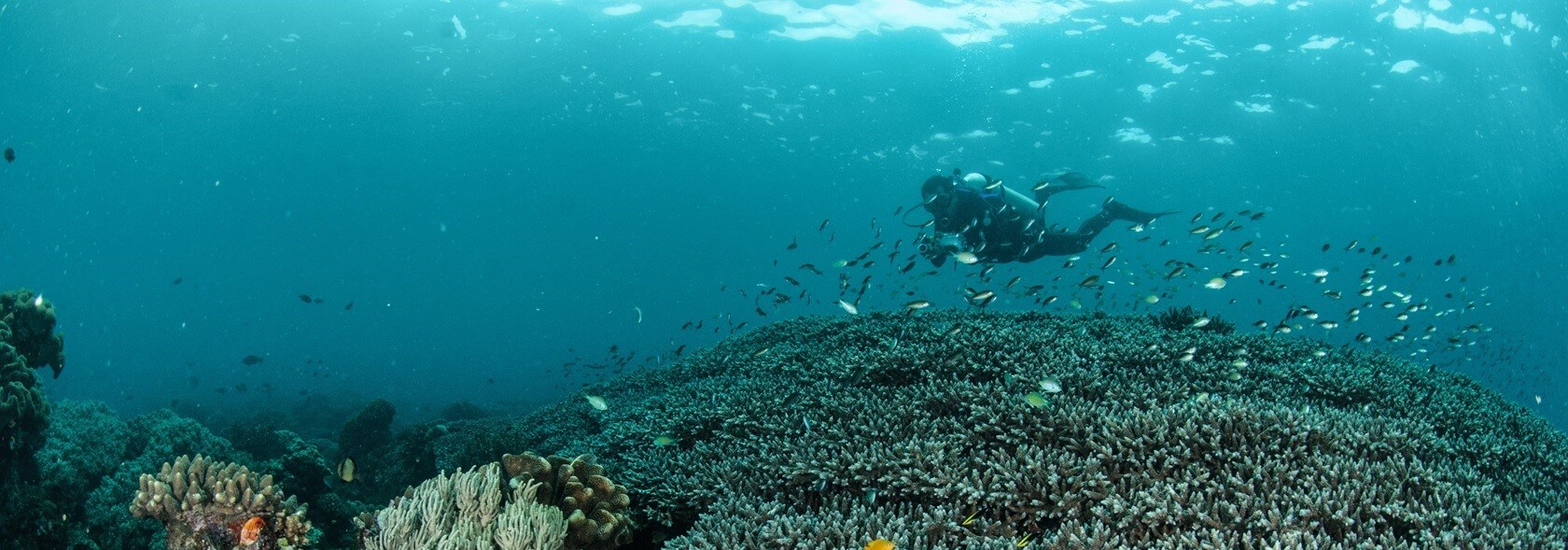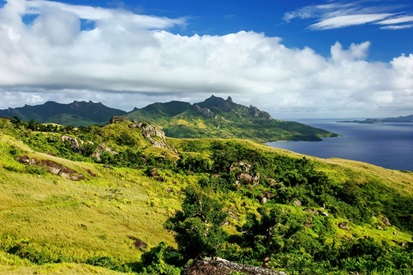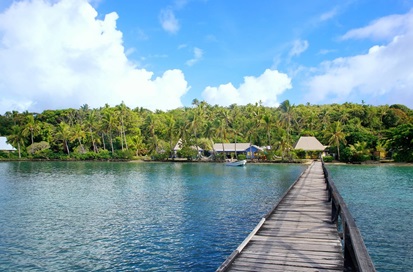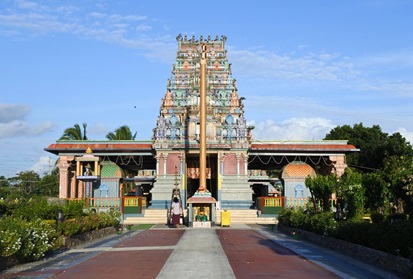

Scuba diving in Fiji is a must on your list of activities. This is a land of stunning reefs with a wide variety of underwater inhabitants. Fiji contains two of the largest barrier reefs. Jacques-Yves Cousteau once called the islands “the soft coral capital of the world.” It is home to hundreds of species of coral fish and many pelagic species. In Fiji, you can experience unforgettable emotions from the bright reef colors and bizarre forms of underwater life, dive into majestic grottoes, caves and sunken ships, and watch the large predators of the deep sea. Fiji is considered one of the world's best archipelagos for diving and swimming among large sharks.

Depositphotos
When to dive in Fiji
Fiji offers favorable diving conditions throughout the year. The water temperature ranges from 25 to 28°C. However, Fiji's tropical climate divides it into two weather seasons - dry and wet. Each of them has its own advantages and disadvantages for diving .
The dry season is from April to October . Excellent underwater visibility, high probability of encounters with whales and manta rays . The only drawback is the tourist congestion, due to which many popular sites receive intense traffic. To enjoy snorkeling in calm conditions, choose the remote and less visited islands of Vanua Levu , Taveuni and Kadavu , where there are many spectacular sites.
The wet season is from November to March . During the hot and rainy season, the water temperature in the ocean is a couple of degrees lower than in the dry season. Rainfall, especially windy rain, can affect the quality of visibility underwater. To me, this is a quiet period for solitary dives. One of the main advantages of diving in the low season is the prices, as they drop nicely. Drier weather at this time of year can be found on the Yasawa and Mamanuca Islands .
Cyclone season . The most difficult times of Fiji's annual cycle are cyclones, accompanied by hurricane winds and intense rainfall. This is not a constant occurrence on the islands, but it does happen. According to observations, the most likely time of year for a cyclone to hit Fiji is from January to March. If diving is the basis of your trip, it is better to choose a different period.

Depositphotos
Why you should dive in Fiji
Undersea world . The strong currents of Fiji's outer reefs bring up nutrient-rich waters from the ocean depths, which in turn attract a wide variety of creatures, from shellfish to huge pelagic species. There are 390 species of coral and about 1,200 species of fish in Fiji's waters. You will be delighted by the underwater landscapes of coral walls, caves, canyons and those who can be found there. People often go diving in Fiji for bull sharks.
Availability . Many of Fiji's dive sites are easily accessible from land-based resorts in many areas, which is certainly another major plus. Local liveaboards also offer maximum opportunities and an incredible number of spectacular dive sites. Whatever location you choose to stop in Fiji, you won’t have to go far for diving .
Education . Fiji is considered the best place in the world to learn scuba diving. Dozens of schools with first-class instructors are open on the islands. Since Fiji's underwater abundance is legendary, this is the best archipelago to practice your skills and completely fall in love with diving .

Depositphotos
Dive Safari in Fiji
Besides being the most spectacular diving in Fiji, it has the best safari offerings in the archipelago. Sea cruises are the key entertainment here. If you have your sights set on scuba diving, a liveaboard dive site will be more suitable than staying at a resort. From the island you will most likely visit only points close to the land, and traveling by boat from the shore will not be economically profitable.
Popular diving safari to the best places in Fiji
Nai'a Fiji . A 36-meter vessel with comfortable conditions for 18 passengers. There are 8 suites on board . Cruises are available for 7 or 10 days. Travel routes - from Astrolabe Reef in the south to Taveuni Island and the Northern group of islands. The cruise includes dives at the Namena Nature Reserve sites , as well as Wakaya and Gau . Cruises are operated by a team of more than 10 people. Cruises from Nai'a Fiji have been leading the diving industry in the Fiji Islands for many years.
Blue Lagoon . Specializes in upscale cruises around Fiji. Diving is part of the trip. The main asset of the Blue Lagoon is the 60-meter catamaran Fiji Princess , which has 34 luxuriously furnished cabins on board. During the cruise, divers can use the services of PADI instructors from West Side Water Sports . During one day of the cruise, up to 4 dives are made at the best sites along the route.
Fiji Aggressor (or Island Dancer II ). 30-meter dive safari boat . 5 luxurious cabins can comfortably accommodate 10 guests. Routes include Nigali Passage , Koro Island and the Namena Marine Reserve .
Reef Endeavor . An all-inclusive cruise that typically explores the Yasawa , Mamanuca and Viti Levu islands . 64-meter vessel with a swimming pool, spa , bars and relaxation areas. This is more of an onboard vacation, including offering dives, rather than traditional diving , so services must be purchased separately.

Depositphotos
Who can you see and when?
Certain types of underwater inhabitants can be observed in Fiji more often and more, depending on the time of year:
- The entire dry season from May to October is the priority of manta rays .
- January-October is bull shark season.
- August and September are the optimal time of year to see humpback whales.
- Coral spawning begins in November.
- From January to March, the most common times to see sea turtles and huge schools of tuna on the reefs.

Depositphotos
Diving schools in Fiji
Fiji has the largest number of schools, because the demand for diving here is the highest of all the Pacific islands. There are scuba diving courses at almost every resort. For beginners, the best conditions are offered here, both natural and organizational, so in Fiji scuba diving will definitely become closer to you, even if you have never held it in your hands before.
The majority of dive schools in Fiji are PADI certified (Professional Association of Diving Instructors ) and SSI (Scuba Diving Schools International). In addition to trial dives, a 4-day Open course is offered Water . With a PADI or SSI certification, you can dive anywhere in the world.

Depositphotos
The best Fiji dive sites
Around each island of Fiji there are dozens of hotspots for diving. Among the most stunning locations it is worth noting:
- Great Astrolabe Reef off Kadavu Island .
- Namena Marine Reserve of Vanua Levu .
- Beka Lagoon, Pacific Harbour.
- Rainbow reef of the Somosomo Strait , off the island of Taveuni .
- Mamanuca and Yasawa Islands , Malolo Barrier Reef .

Depositphotos
Great Astrolabe Reef
This is one of the largest barrier reefs in the world, reaching more than 100 kilometers in length. It extends along the southern coast of Kadavu Island , arcing northeast past Ono Island to Bulia Island . The Great Astrolabe Reef is a breeding ground for large fish such as tuna, marlin and several species of sharks. The environment is conducive to colorful and adventurous diving . The most famous soft coral garden on the reef is Naikoro Strait . The most beautiful underwater canyons and arches on the western side of the reef - Split Rock , Broken Stone and Vouwa .
In terms of access, diving here is very comfortable . Resorts with local dive centers are scattered throughout Kadavu Island . Each offers a variety of sites to explore, including Astrolabe Reef, Muto Marine Sanctuary and dives to the 63m Pacific Voyager wreck.
For swimming with manta rays , check out Matava Eco Resort on Kadavu Island . The resort offers diving and snorkeling on a unique Manta Reef 40 minutes by boat.

Depositphotos
Namena Marine Reserve
This is one of the most fabulous dive sites in Fiji. Scuba diving tours in the Namena Nature Reserve are very popular. Located between Fiji's two main islands - Viti Levu and Vanua Levu , on a beautiful 16 km barrier reef. Is it worth talking about biodiversity , since fishing has been banned here for almost 20 years. There are over 400 species of coral, 445 recorded species of marine plants and over 1,100 species of fish. The migratory routes of bottlenose dolphins, spinner dolphins and humpback whales pass through the reserve . Endangered green and hawksbill sea turtles regularly nest on Namena's beaches .
Popular dive sites Namena :
- Grand Central Station . An excellent site for encounters with pelagic species.
- Magic Mound . Hard and soft corals, multiple anemones and lionfish, whitetip and gray reef sharks in large numbers.
- Chimneys . Amazing garden of soft corals, with barracudas, whitetip and gray reef sharks.
- Blue Ribbon . Two coral walls at a distance of 50 meters from each other. These are home to diverse marine life with the most incredible views.
Among the best accommodation options with stunning diving excursions to the Namena - Cousteau nature reserve Resort and Namale Resort Also a 4 star dive resort Volivoli Beach The Resort offers 80 dive sites in the strait between Viti Levu and Vanua Levu within easy access.

Cousteau Resort
Beka Lagoon
The main island of Viti Levu has some amazing top -notch diving locations . One of them is located near Beka Island. The lagoon is surrounded by one of the world's largest barrier reefs. Not only is it home to many amazing coral species, but it is also one of the best places to dive with sharks. Here you can dive on the famous Shark Reef, where 8 species of predators swim. An activity for real adventurers. The reef is located near the southern coast of Viti Levu .
Beqa Island and Pacific Harbor have several resorts with their own dive operators . Here you can learn diving and immediately consolidate your skills on the world's best sites. An excellent option chosen by divers is the Beqa resort Island Resort It provides access to almost a hundred sites.

Beqa Lagoon Resort
Rainbow reef on Taveuni
Between the islands of Vanua Levu and Taveuni in the Somosomo Strait , there is a reef hidden under the water, which is distinguished by a kaleidoscope of bright underwater colors. Rainbow Reef is one of the most spectacular sites in Fiji, delighting even the most jaded divers . Due to the strong currents, it is only suitable for experienced divers. Here you can dive at the Great White Wall of soft corals, which stretches for 30 meters. A very popular place. During the season you will see large concentrations of manta rays , as well as different types of sharks: whitetip and blacktip reef, lemon, nurse, silver and bull sharks.
Koro Sun The Resort offers dive tours to the Somosomo Strait and a wide range of accommodation options.

Depositphotos
Diving on the Mamanuca and Yasawa Islands
Mamanuca is a group of small volcanic islands off the west coast of Viti Levu . It has several luxury resorts and mid-range hotels, excellent weather conditions even in the wet season, and stunning scuba diving spots. The sites on the Mamanuca are ideal for beginners, because the local reefs are almost free of strong currents.
The best dive sites near the Mamanuca Islands :
- Mamanuca Lagoon . Protected by a reef, it has calm waters and is a good location for beginner divers .
- Plantation Pinnacle and Three Bommies , with peaks and walls of soft and hard corals, and anemone gardens.
- Salamander . The site of a cruise ship wreck at a depth of 30 meters.
- Supermarket . Former feeding station and excellent location for swimming among several species of reef sharks.
- Malolo Barrier Reef Sites . Multiple aisles with exceptional visibility. The legendary place is the Namotu Wall , which goes a kilometer deep. This is a whole separate world of the Pacific Ocean, where there are large concentrations of pelagic animals of different species.
North of the Mamanuca Archipelago there is another western scattering of Fijian islands with stunning diving spots. The Yasawa Islands are surrounded by beautiful fringing reefs, with magnificent underwater labyrinths, canyons and caves.
- Zoo . A steep wall between the islands of Nakula and Tawewa . These are the most fertile pelagic places of the western islands.
- Caves of Babylon . Challenging caves for experienced divers. Located near Naviti Island .
- Dravaka Island . Has excellent spots for swimming with manta rays . A large number of animals from May to October.
- Diving with sharks off Kuata Island . Here you can find not only bull sharks, but also nurse sharks, lemon sharks, tiger sharks and even hammerhead sharks.
Several popular Fiji hotels in the Mamanuca and Yasawa Islands area :
- Castaway Island Fiji
- Likuliku Lagoon Resort
- Mana Island Resort
- Vomo Island Resort
- Malolo Island Resort
- Coralview Island Resort
- Paradise Cove Resort
- Navutu Stars Resort
- Barefoot Manta Island Resort

Depositphotos
Price diving on Fiji
Diving on the islands of Fiji cannot be called a cheap pleasure. But prices may vary depending on the remoteness of the location, resort, cruise, rental of necessary equipment and many other factors. In any case, a diving subscription for 3 days or more will be more profitable than diving once.
dive destinations such as the Coral Coast, Kadavu , Yasawa and Mamanuca Islands charge around FJD 700-800 for a 3-day dive. This usually includes 2 cylinders and rental of all equipment. A little more expensive in some select places. So, diving in the Namena Nature Reserve - 350 FJD for one day (2 cylinders). Diving with sharks in Pacific Harbor - 350-400 FJD per day (2 cylinders).
Keep in mind that prices for diving services at resorts are always higher. Let's take an example of prices from Jean - Michel Cousteau Resort on the island of Savusavu . This is one of Fiji's leading eco- diving resorts . The Jean-Michel Cousteau complex is open here , with a center for certified divers and high-quality courses for beginners.
- Single dive (1 cylinder) - 290 USD
- Single dive (2 cylinders) - 495 USD
- Two dives with equipment rental - 595 USD
- Dive safari on half a day with equipment rental - 520 USD
- 3-day diving safari (1 tank) - 730 USD
- 3-day diving safari (2 cylinders) - 1240 USD
- Full Scuba Certificate (minimum 3 days, including equipment) - 1490 USD
Diving is the most amazing thing that can happen to you in Fiji!

Jean-Michel Cousteau Resort
More articles
- Indonesia's National Parks: 15 Amazing Reserves
- 17 Temples in Bali You Must See
- Hot Springs in Bali: Which and Where to Visit
- Indonesia's Natural Attractions: 18 Places Worth Seeing
- Meru Betiri National Park in Indonesia
- The Most Interesting Routes in Bali: 12 of the Best
- Mauritius in Winter: Weather and Top Attractions
- Samosir Island in Sumatra: All About Vacationing
- The Maluku Islands in Indonesia: All About Vacations
- 10 Unique Facts About Indonesia



